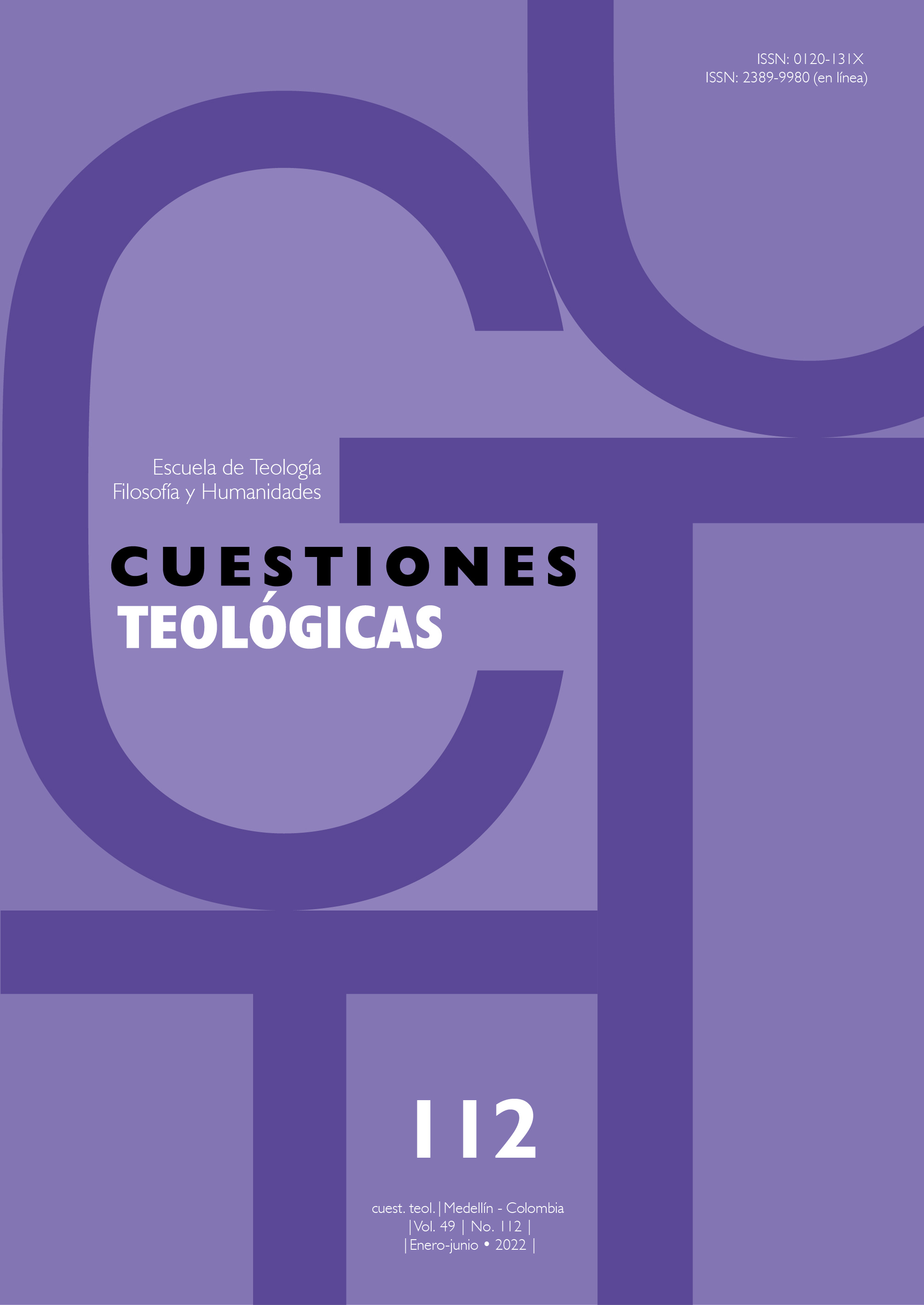Augustine of Hippo and the rediscovery of the therapeutic potential of narrative theology for mental health
Main Article Content
Abstract
Since the task of therapy was a concern of classical antiquity, Hellenistic philosophy produced complex understandings on illness, treatment, and health that would inspire Augustine of Hippo (354-430) to adapt these ideals within a theological framework. Confessions (397-401) proposes an experience before divine grace that generates therapeutic effects, a proposal that fosters health and hope for his audience (Conf .10.3.4). Nevertheless, during the 20th century, Augustine’s Confessions was taken as a case study for psychoanalytic and psychotherapeutic theories. The weaknesses and ambiguities narrated by Augustine were considered case study material to be fitted into concepts of psychological theory or psychopathology. Faced with the task of reviewing the dialogue between Augustinian studies and psychological studies, this article suggests that it is necessary to retrace a path, overcoming a methodological problem through three steps: firstly, a historical recovery of late antiquity philosophical therapy, placing the original intent of Confessions’ therapeutic vision in its cultural, historical, and theological context; secondly, a repositioning of the interdisciplinary dialogue between psychology and theology. Despite the inadequacies of Augustine's psychologizing readings, understanding Confessions in partnership with contemporary psychology, allowing cross-fertilization, is a valid and necessary task, as in the conceptual synergy with Elementary Experience in Psychology; thirdly, the establishment and conduct of new interdisciplinary initiatives that not only strengthen historical and psychological understanding of Augustine’s Confessions, but seek to understand, apply and empirically test his narrative theological approach on its mental health effects.
References
Agostinho, S. (1984). Confissões (Conf). (M. L. J. Amarante, Trad.). São Paulo: Paulus.
Agostinho, S. (1998). Solilóquios e a vida feliz (Sol.). (N. Oliveira, Trad.). São Paulo: Paulus.
Agostinho, S. (2019). Retratações (Retrac.). (Agustinho Belmonte, Trad.). São Paulo: Paulus.
Archembault, P. (1990). “Augustine’s Confessiones: On the Uses and the Limits of Psychobiography”. Em Collectanea Augustiniana: Mélanges T. J. Van Bavel, Bernard Bruning, Mathijs Lamberigts & Jozef Van Houtem (Eds.). Heverlee: Augustinian Historical Institute.
Boone, M. (2016). The Conversion and Therapy of Desire: Augustine's Theology of Desire in the Cassiciacum Dialogues. Eugene: Pickwick. https://doi.org/10.2307/j.ctvz0hbsp
Brachtendorf, J. (2008). Confissões de Agostinho. São Paulo: Loyola.
Bruner, J. (2004). “Life as Narrative”. Social Research 71, no. 3: 691-710. https://doi.org/10.1353/sor.2004.0045
Clark, G. (1993). Augustine: The Confessions. Cambridge: Cambridge University Press.
Dixon, S. L. (2013). “Teaching Freud and interpreting Augustine’s Confessions”. Em Augustine and Psychology, Sandra Lee Dixon, John Doody & Kim Paffenroth (Eds.). Lanham: Lexington Books.
Dupont, A. Walraet, P. (2015), “Augustine on the Heart as the Centre of Human Happiness”. Studies in Spirituality, 25: 45-77.
Fredriksen, P. (1978). “Augustine and his Analysts: The Possibility of a Psychohistory”. Soundings 61, 206-227.
Freud, S. (2012). The Future of an Illusion. (T. Dufresne, trad). Peterborough: Broadview.
Giussani, L. (2009). O senso religioso. (P. Oliveira, trad.). Brasília: Universa.
Hadot, P. What is Ancient Philosophy? Cambridge: Harvard University Press, 2002.
Hartog, I., Scherer-Rath, M., Kruizinga, R. (2020). “Narrative Meaning Making and Integration: Toward a Better Understanding of the Way Falling Ill Influences Quality of Life”. Journal of Health Psychology 25, no. 6: 738-54. https://doi.org/10.1177/1359105317731823
Kligerman, C. (1957). “A Psychoanalytic Study of the Confessions of St. Augustine”. Journal of the American Psychoanalytic Association 5, no. 3, 469-484. https://doi.org/10.1177/000306515700500306
Koenig, H. (2001). Handbook of Religion and Health: a Century of Research Reviewed. Oxford, Oxford University Press.
Kolbet, P. (2010). Augustine and the Cure of Souls: Revising a Classical Ideal. Notre Dame: University of Notre Dame Press. https://doi.org/10.2307/j.ctvpj7fdq
Mahfoud, M. (2012). Experiência Elementar em Psicologia: aprendendo a reconhecer. Brasília, Universa.
Massimi, M. (2013). “Narrativa autobiográfica e experiência subjetiva, segundo Agostinho e seus intérpretes contemporâneos”. Memorandum: Memória e História em Psicologia, no. 25, 38-51.
Pargament, K. (1997). The Psychology of Religion and Coping: Theory, Research, Practice. New York: Guilford.
Park, C. (2007). “Religiousness/Spirituality and Health: A Meaning Systems Perspective”. Journal of Behavioral Medicine 30, no. 4: 319-28. https://doi.org/10.1007/s10865-007-9111-x
Park, C. (2010). “Making Sense of the Meaning Literature”. Psychological Bulletin 136, no. 2: 257-301. https://doi.org/10.1037/a0018301
Pennebaker, J. (1993). “Putting Stress into Words: Health, Linguistic, and Therapeutic Implications”. Behaviour Research and Therapy 31, no. 6: 539-48. https://doi.org/10.1016/0005-7967(93)90105-4
Pennebaker, J., & Chung, C. (2011). Expressive writing and its links to mental and physical health. Em H. Friedman (Ed.) Oxford handbook of health psychology, 417-437. New York: Oxford University Press.
Petrini, G. (2012). Prefácio de Experiência Elementar em Psicologia: aprendendo a reconhecer, Miguel Mahfoud, 15-27. Brasília, Universa.
Pieretti, A. (1998). “Doctrina antropológica agustiniana”. Em El pensamiento de San Agustin para el hombre de hoy: la filosofia agostiniana, José Oroz Reta & José Galindo (Eds.), vol. 1, 329-404. Valencia: EDICEP.
Ricœur, P. (1984). Time and Narrative. (Vol. I), (K. McLaughlin and D. Pellauer, Trad.). Chicago: University of Chicago Press.
Reinhold, M., Bürkner, P., and Holling, H., (2018). “Effects of Expressive Writing on Depressive Symptoms-A Meta-analysis.” Clinical Psychology 25, no. 1: E12224. https://doi.org/10.1111/cpsp.12224
Scherer-Rath, M. (2014). “Narrative reconstruction as creative contingency.” Em Ganzevoort, R., (ed.) Religious Stories We Live By: Narrative Approaches in Theology and Religious Studies, 131–142. Leiden: Brill. https://doi.org/10.1163/9789004264069_011
Sloan, M. and Marx, B. (2018). “Maximizing Outcomes Associated with Expressive Writing”. Clinical Psychology 25, no. 1: E12231. https://doi.org/10.1111/cpsp.12231
Turner, P. (2013). “Autobiography and autobiographical writing”. Em Pollmann, K., Otten, W. (Eds.) The Oxford Guide to the Historical Reception of Augustine, 603-604. Oxford: Oxford University Press.
Vessey, M. (Ed.). (2012). A Companion to Augustine. Blackwell Companions to the Ancient World. Chichester: Wiley-Blackwell. https://doi.org/10.1002/9781118255483






